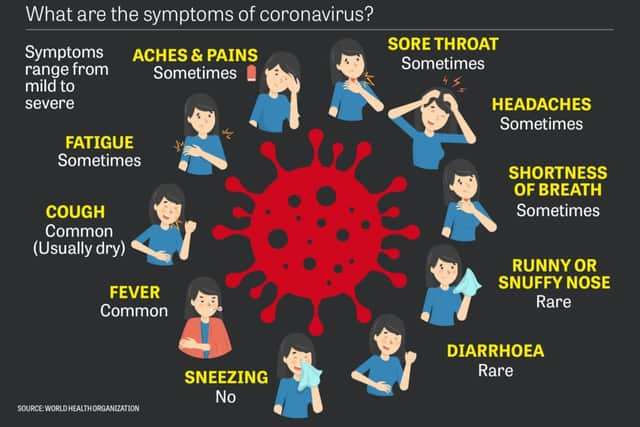This is how you can help homeless people during the coronavirus crisis


The coronavirus pandemic has taken its toll on the UK, with cases rising daily, schools closing and many people losing their jobs.
Thousands have rushed to shops to stockpile essentials in order to self-isolate causing food banks donations to plummet. But how do you self-isolate if you are homeless?
Advertisement
Hide AdAdvertisement
Hide AdIt has emerged that homeless people are at high risk from the virus, as they often don’t have places to wash their hands, struggle with health problems and are at risk of infection in crowded shelters. Here are a few ways you can support the homeless in your local community.


(Photo: WHO)
Donate to a food bank
Charity bosses are concerned that members of the public have stopped donating to food banks because they are keeping supplies for themselves.
Emma Revie, chief executive of the Trussell Trust, said, "With the spread of coronavirus we all now face an unprecedented challenge and uncertain future.”
"It is possible that food banks will face increased demand as people lose income, at the same time as food donations drop or staff and volunteers are unavailable, due to measures rightly put in place to slow the spread of infection.”
Advertisement
Hide AdAdvertisement
Hide AdCheck which items your nearby food bank needs - this can be easily accessed online - and donate those if you are able to.
You can find out where your nearest food bank is by putting your postcode into the Trussell Trust map - then visit their website to find out how to donate food.
Support a street vendor
Vendors selling the Big Issue are often homeless, and rely on donations for their livelihood. But, due to the Covid-19 virus outbreak, vendors have been told they cannot sell copies of the magazine on the street.
The Big Issue has issued a desperate plea for help as it struggles to generate income from sales.
Advertisement
Hide AdAdvertisement
Hide AdYou can now buy the publication through their shop or online. Alternatively, subscribe for three months while vendors aren't on the streets, or donate.
Donate essentials to a local shelter
Homeless shelters and hostels have been plunged into uncertainty, and some have had to close due to the spread of infection.
However, many have made the decision to keep their doors open despite the added risk.
Many shelters across the country are pleading for essentials such as hand sanitiser, soap, board games and sleeping bags.
Call a homeless helpline
Advertisement
Hide AdAdvertisement
Hide AdIf you see someone on the streets who urgently needs help, you can call a homeless helpline.
Shelter UK’s national helpline is 0808 800 4444. You can also get in touch with the Salvation Army on (020) 7367 4500.
Coronavirus: the facts
What is coronavirus?
COVID-19 is a respiratory illness that can affect lungs and airways. It is caused by a virus called coronavirus.
What caused coronavirus?
The outbreak started in Wuhan in China in December 2019 and it is thought that the virus, like others of its kind, has come from animals.
How is it spread?
Advertisement
Hide AdAdvertisement
Hide AdAs this is such a new illness, experts still aren’t sure how it is spread. But, similar viruses are spread in cough droplets. Therefore, covering your nose and mouth when sneezing and coughing, and disposing of used tissues straight away is advised. Viruses like coronavirus cannot live outside the body for very long.
What are the symptoms?
The NHS states that the symptoms are: a dry cough, high temperature and shortness of breath - but these symptoms do not necessarily mean you have the illness. Look out for flu-like symptoms, such as aches and pains, nasal congestion, runny nose and a sore throat. It’s important to remember that some people may become infected but won’t develop any symptoms or feel unwell.
What precautions can be taken?
Washing your hands with soap and water thoroughly. The NHS also advises to cover your mouth and nose with a tissue or your sleeve (not your hands) when you cough or sneeze; put used tissues in the bin immediately and try to avoid close contact with people who are unwell. Also avoiding touching eyes, nose and mouth unless your hands are clean.
Government advice
As of Monday 16 March the government advised that everyone should be observing social distancing - avoiding unnecessary travel and working from home where possible. Anyone with a cough or cold symptoms now needs to self-isolate with their entire household for 14 days.
Advertisement
Hide AdAdvertisement
Hide AdThe government has now instructed bars, restaurants and theatres to close and will review on a ‘month to month’ basis. Schools closed from Friday 20 March for the foreseeable future, and exams have been cancelled.
The over 70s or anyone who is vulnerable or living with an underlying illness are being asked to be extra careful and stay at home to self-isolate. People with serious underlying health conditions will be contacted and strongly advised to undertake "shielding" for 12 weeks.
For more information on government advice, please check their website.
Should I avoid public places?
The advice now is to avoid public places and any non-essential travel. Travel abroad is also being advised against for the next 30 days at least, and many European countries have closed their borders.
What should I do if I feel unwell?
Advertisement
Hide AdAdvertisement
Hide AdDon’t go to your GP but instead call NHS 111 or look online at the coronavirus service that can tell you if you need medical help and what to do next.
When to call NHS 111
NHS 111 should be used if you feel unwell with coronavirus symptoms, have been in a country with a high risk of coronavirus in the last 14 days or if you have been in close contact with someone with the virus.
Sources: World Health Organisation and NHS